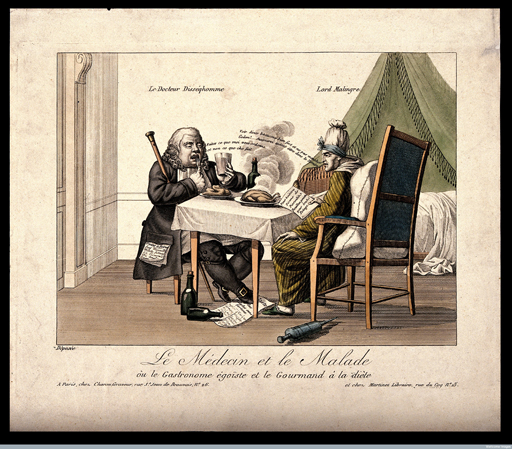1 A regimen for everyone
The process of eating and drinking was monitored by doctors and ordinary people in the ancient world. This applied to adults and children, healthy and sick.
In the ancient world, the first option for treating disease was diet rather than drugs or surgery. Diet was also seen as very important for maintaining health. Ancient doctors devised ‘regimens’, which were lifestyle plans focused on diet but also included exercise, bathing, sleep and other aspects of life believed to affect the body. These would vary with the seasons of the year.
An ancient Greek medical text, Regimen in Health (one of the Hippocratic texts, from perhaps the end of the fifth century BCE), opens with advice to ordinary people that, in winter, they should eat as much as possible and drink as little as possible. All meat eaten in winter should be roasted, to make it dry. This keeps the body in general dry and warm. As spring comes on, people should gradually drink more and move towards boiled meat rather than roasted, so that by the time of summer all meats are boiled, and thus more ‘wet’, as is appropriate when the heat of the season is drying out the body.
However, the seasons were not the only point to consider. Regimens would also vary with the age, gender and body type of the patient. Those with fleshy soft bodies should keep to ‘dry’ foods for most of the year, to counteract their natural wetness. People’s individual habits should also be considered, as it could be dangerous to impose on someone a foodstuff, or a quantity of food, with which they were not familiar.
So, balancing the diet was seen as a complex process. Another Greek medical text, Nutriment, suggests simply that food has ‘power’ (in Greek, dynamis) as it can both nourish and change the body. Nutriment argues that no foodstuff is simply good or bad; it all depends on the circumstances. So, for some people, milk is a nutriment, but for others it is not.
Eating cooked food rather than raw food, and in particular bread and meat, was seen as something that set apart the ancient Greeks and Romans not only from the animal kingdom, but also from neighbouring peoples. Bread was seen as a particularly important food and, because the body was also thought to be affected by what is placed on it, it could be used as the basis of an external remedy. Soaked in herbs and oil, bread was applied to the skin to encourage pus to come out of the body.
One Hippocratic medical text even argued that it was doctors who had made health possible because it was they who had realised that humans should not live on the same food as animals:
I hold that not even the mode of living and nourishment enjoyed at the present time by men in health would have been discovered, had a man been satisfied with the same food and drink as satisfy an ox, a horse, and every animal save man, for example the products of the earth—fruits, wood and grass.
However, in addition to humans eating cooked food, further ‘cooking’ also took place in the body itself. Food was thought to begin its transformation in the mouth, and then undergo further changes in the stomach until it eventually became blood. Galen described the process of the maintenance of the body like this:
nobody will suppose that bread represents a kind of meeting-place for bone, flesh, nerve, and all the other parts, and that each of these subsequently becomes separated in the body and goes to join its own kind; before any separation takes place, the whole of the bread obviously becomes blood.
He described the digestive organs in terms of their heat:
And if one considers along with this the adjacent viscera, like a lot of burning hearths around a great cauldron—to the right the liver, to the left the spleen, the heart above, and along with it the diaphragm (suspended and in a state of constant movement), and the omentum sheltering them all—you may believe what an extraordinary alteration it is which occurs in the food taken into the stomach.
Cooking was also considered an art form within the elites of the ancient world, where eating unusual foods or parts of animals and birds was part of rich people’s banquets. By the early Roman Empire, Greek and Roman banquets seem to have had a lot in common – you can even think in terms of an ‘international Mediterranean cuisine’.

